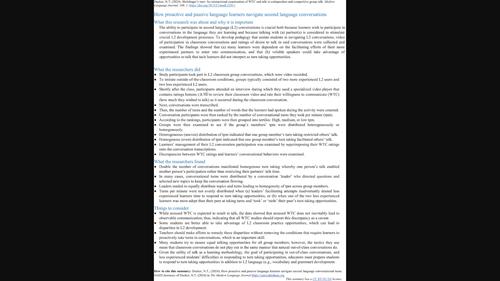薛定谔的转变:对依赖型和竞争型群体谈话中交流和谈话意愿的互动研究
IF 0.1
3区 文学
0 LITERATURE
引用次数: 0
摘要
语言学习者经常需要在课堂上协商参与结对和小组合作;因此,交流意愿(WTC)可能是决定第二语言(L2)成功与否的关键因素。课堂上的交际意愿是不稳定的,并受对话者相关变量的影响,如互惠身份、小组成员资格和氛围以及同伴支持;然而,这些前因通常是从心理学或生态学的角度进行研究的,即考察学习者对环境因素的认知和情感反应。这些研究很少对谈话本身进行测量;然而,有人认为,会话行为是一个关键的永利国际因素。谈话和永利国际娱乐产生于所有对话者之间协商的交际空间;因此,本文将轮流发言和分享发言等会话行为定位为永利国际娱乐的关键决定因素。来自 16 个英语为外语(EFL)的课堂会话的非动力数据显示:(a)取决于学习者的反应,会话浮动时间可以表现出依赖性和竞争性的两面;(b)EFL 学习者的永利国际和参与高度依赖于有经验的英语使用者的促进性操作;(c)与沉默寡言的学生相比,更善于表达的 EFL 学生能更好地利用有经验的学生提供的实惠。鉴于课外永利国际和 L2 接触的最终目标,研究结果对培训 EFL 学习者控制会话浮动时间的交际技巧具有重要意义。本文章由计算机程序翻译,如有差异,请以英文原文为准。

Schrödinger's turn: An interactional examination of willingness to communicate and talk in codependent and competitive group talk
Language learners are often required to negotiate classroom participation in pair and group work; therefore, willingness to communicate (WTC) could be a key determiner of second language (L2) success. Classroom WTC is volatile and influenced by interlocutor-related variables, such as reciprocal identities, group membership and atmosphere, and peer support; however, these antecedents are often studied from a psychological or ecological standpoint, in which learners’ cognitive and affective reactions to environmental factors are examined. These examinations rarely measure talk itself; however, it has been suggested that a key WTC factor is conversational behaviors. Talk and WTC arise in a communicative space negotiated between all interlocutors; therefore, this article positions conversational maneuvers, such as turn-taking and floor sharing, as key determiners of WTC. Idiodynamic data from 16 English-as-a-foreign-language (EFL) classroom conversations showed that (a) dependent on learner reactions, conversational floortime could manifest codependent and competitive facets, (b) EFL learners’ WTC and participation was highly dependent on experienced English users’ facilitating maneuvers, and (c) more voluble EFL students took better advantage of the affordances their experienced counterparts provided than taciturn students. Given the ultimate goal of out-of-class WTC and L2 contact, the findings have important implications for training EFL learners in communicative maneuvers to control conversational floortime.
求助全文
通过发布文献求助,成功后即可免费获取论文全文。
去求助
来源期刊
自引率
0.00%
发文量
0
期刊介绍:
The Journal of the Midwest Modern Language Association publishes articles on literature, literary theory, pedagogy, and the state of the profession written by M/MLA members. One issue each year is devoted to the informal theme of the recent convention and is guest-edited by the year"s M/MLA president. This issue presents a cluster of essays on a topic of broad interest to scholars of modern literatures and languages. The other issue invites the contributions of members on topics of their choosing and demonstrates the wide range of interests represented in the association. Each issue also includes book reviews written by members on recent scholarship.

 求助内容:
求助内容: 应助结果提醒方式:
应助结果提醒方式:


